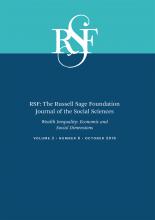Abstract
Despite the strong relationship between the rise in mass incarceration over the last forty years and racial inequality in employment and wages, few studies have examined the long-term consequences and spillover effects of criminal justice contact on the black-white wealth gap in the United States. In this paper, we investigate the mechanisms whereby the local and distal incarceration of a family member affects household wealth, focusing on wealth disparities by race and education. Using data from the Survey of Income and Program Participation (SIPP), the Current Population Survey, and the Survey of Inmates in State and Federal Correctional Facilities and Local Jails, we apply fixed-effects and probit models to estimate how a family member’s incarceration influences household assets and debt over panel waves. We find that having an incarcerated family member reduced household assets by 64.3 percent and debt by 85.1 percent after we adjusted for the underrepresentation of institutionalization in SIPP data. We also discuss these findings in the context of broader racial disparities in wealth and employment. Our findings demonstrate how contemporary patterns of mass incarceration contribute to the maintenance of social inequality in wealth and form barriers to economic security for other household members.
- Copyright © 2016 by Russell Sage Foundation. All rights reserved. Printed in the United States of America. No part of this publication may be reproduced, stored in a retrieval system, or transmitted in any form or by any means, electronic, mechanical, photocopying, recording, or otherwise, without the prior written permission of the publisher. Reproduction by the United States Government in whole or in part is permitted for any purpose. An earlier version of this paper was presented at the Russell Sage Wealth Inequality Meeting in October 2015 and the 2016 Annual Meeting of the Population Association of America. We thank Fabian Pfeffer, Robert Schoeni, Sheldon Danziger, Robert Hauser, Alexandra Killewald, anonymous reviewers, and participants of the RSF Wealth Inequality Meeting for comments on previous versions of our paper. Direct correspondence to: Bryan L. Sykes at blsykes{at}uci.edu, 3317 Social Ecology II, University of California, Irvine, CA 92697; and Michelle Maroto at maroto{at}ualberta.ca, 6-23, Tory Building, University of Alberta, Edmonton, AB T6G 2H4, Canada.
Open Access Policy: RSF: The Russell Sage Foundation Journal of the Social Sciences is an open access journal. This article is published under a Creative Commons Attribution-NonCommercial-NoDerivs 3.0 Unported License.






